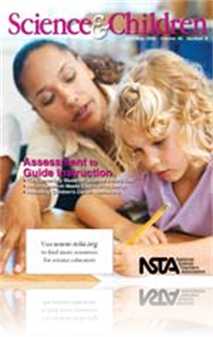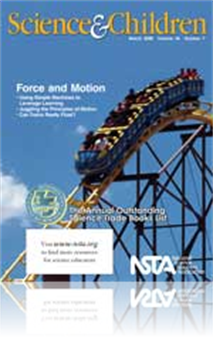All Science and Children resources
Journal Article
Let’s Fight for Inquiry Science!
In today’s climate of standardized testing, the author shares his concern that colleagues who are currently implementing inquiry-based science that awakens students’ curiosity may soon be thwarted by mandated, time-consuming, packaged programs. H...
Journal Article
This monthly feature contains facts and challenges for the science explorer....
Journal Article
This monthly feature contains facts and challenges for the science explorer....
Journal Article
Perspectives: Making the Most of Professional Development
Teacher preparation programs help teachers build a foundation for entering the teaching profession. However, learning to teach science cannot be achieved in a mere four years—it is a lifelong endeavor. Teachers continue to learn new science content...
Journal Article
Science 101: How do animals communicate underwater?
Well, they often use hand signals, such as the “OK” sign, and sometimes they write on message boards. So much for how SCUBA divers (classified as animals) communicate! Other than the authors’ knowledge of sound waves and how they move air and w...
Journal Article
In Praise of Performance-Based Assessments
Performance-based assessments are tasks conducted by students that enable them to demonstrate what they know about a given topic. The difference between this type of “test” versus the traditional method is that students are given the opportunity ...
Journal Article
Teaching Through Trade Books: Taking Note of Natural Resources
The idea of “going green” or being aware of and reducing our impact on natural resources is receiving a lot of attention these days. Schools are starting to employ “green” practices and are soliciting help from the students to be aware of and...
Journal Article
This hands-on, minds-on zoo project provides a fun and safe opportunity for students to experience the world of animals and nature right in their own classroom. Students have the chance to work individually or in small groups to explore, observe, and...
Journal Article
Outstanding Science Trade Books for Students K—12 (Books Published in 2007: Science and Children)
Each of these outstanding selections defies the traditional image of a child “curling up with a good book.” Yes, they can be a source of great personal reading, encouraging students of all ages to stretch their skills and their imagination as the...
Journal Article
Science Shorts: “Knowing” Newton
Newton’s Laws seem simple and familiar. Despite their apparent simplicity, these laws are often misunderstood. In the following lesson, students will become better acquainted with Newton and his laws as they test what happens when a force is applie...
Journal Article
This monthly feature contains facts and challenges for the science explorer. ...
Journal Article
Editor’s Note: Force and Motion—Complex, Awesome, Relevant
We know that when something is relevant to a student, the student is more motivated to learn and also more likely to remember. What could be more relevant than force and motion? The universe, like an eight-year-old, is in constant motion. Force and m...
Journal Article
Have you ever heard of a Maglev train? Who would be crazy enough to think that exploring how a high-tech train little known in the United States works with a group of fourth-grade students would yield understandings about the properties of magnetism,...
Journal Article
Using Simple Machines to Leverage Learning
What would your students say if you told them they could lift you off the ground using a block and a board? Using a simple machine, they’ll find out they can, and they’ll learn about work, energy, and motion in the process! In addition, this inte...



